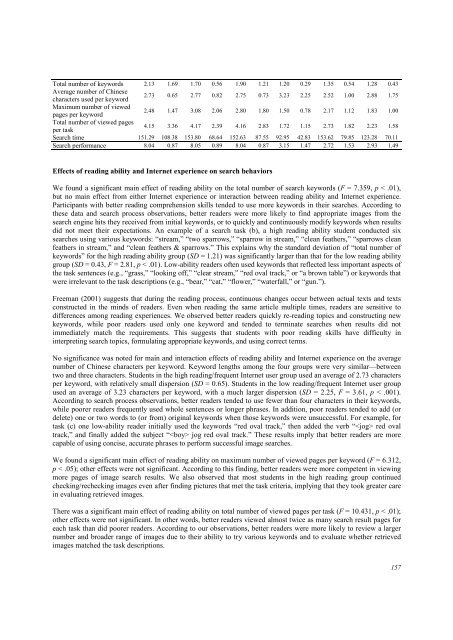Download Complete Issue in PDF - Educational Technology & Society
Download Complete Issue in PDF - Educational Technology & Society
Download Complete Issue in PDF - Educational Technology & Society
You also want an ePaper? Increase the reach of your titles
YUMPU automatically turns print PDFs into web optimized ePapers that Google loves.
Total number of keywords 2.13 1.69 1.70 0.56 1.90 1.21 1.20 0.29 1.35 0.54 1.28 0.43<br />
Average number of Ch<strong>in</strong>ese<br />
characters used per keyword<br />
2.73 0.65 2.77 0.82 2.75 0.73 3.23 2.25 2.52 1.00 2.88 1.75<br />
Maximum number of viewed<br />
pages per keyword<br />
2.48 1.47 3.08 2.06 2.80 1.80 1.50 0.78 2.17 1.12 1.83 1.00<br />
Total number of viewed pages<br />
per task<br />
4.15 3.36 4.17 2.39 4.16 2.83 1.72 1.15 2.73 1.82 2.23 1.58<br />
Search time 151.29 108.38 153.80 68.64 152.63 87.55 92.95 42.83 153.62 79.85 123.28 70.11<br />
Search performance 8.04 0.87 8.05 0.89 8.04 0.87 3.15 1.47 2.72 1.53 2.93 1.49<br />
Effects of read<strong>in</strong>g ability and Internet experience on search behaviors<br />
We found a significant ma<strong>in</strong> effect of read<strong>in</strong>g ability on the total number of search keywords (F = 7.359, p < .01),<br />
but no ma<strong>in</strong> effect from either Internet experience or <strong>in</strong>teraction between read<strong>in</strong>g ability and Internet experience.<br />
Participants with better read<strong>in</strong>g comprehension skills tended to use more keywords <strong>in</strong> their searches. Accord<strong>in</strong>g to<br />
these data and search process observations, better readers were more likely to f<strong>in</strong>d appropriate images from the<br />
search eng<strong>in</strong>e hits they received from <strong>in</strong>itial keywords, or to quickly and cont<strong>in</strong>uously modify keywords when results<br />
did not meet their expectations. An example of a search task (b), a high read<strong>in</strong>g ability student conducted six<br />
searches us<strong>in</strong>g various keywords: “stream,” “two sparrows,” “sparrow <strong>in</strong> stream,” “clean feathers,” “sparrows clean<br />
feathers <strong>in</strong> stream,” and “clean feathers & sparrows.” This expla<strong>in</strong>s why the standard deviation of “total number of<br />
keywords” for the high read<strong>in</strong>g ability group (SD = 1.21) was significantly larger than that for the low read<strong>in</strong>g ability<br />
group (SD = 0.43, F = 2.81, p < .01). Low-ability readers often used keywords that reflected less important aspects of<br />
the task sentences (e.g., “grass,” “look<strong>in</strong>g off,” “clear stream,” “red oval track,” or “a brown table”) or keywords that<br />
were irrelevant to the task descriptions (e.g., “bear,” “cat,” “flower,” “waterfall,” or “gun.”).<br />
Freeman (2001) suggests that dur<strong>in</strong>g the read<strong>in</strong>g process, cont<strong>in</strong>uous changes occur between actual texts and texts<br />
constructed <strong>in</strong> the m<strong>in</strong>ds of readers. Even when read<strong>in</strong>g the same article multiple times, readers are sensitive to<br />
differences among read<strong>in</strong>g experiences. We observed better readers quickly re-read<strong>in</strong>g topics and construct<strong>in</strong>g new<br />
keywords, while poor readers used only one keyword and tended to term<strong>in</strong>ate searches when results did not<br />
immediately match the requirements. This suggests that students with poor read<strong>in</strong>g skills have difficulty <strong>in</strong><br />
<strong>in</strong>terpret<strong>in</strong>g search topics, formulat<strong>in</strong>g appropriate keywords, and us<strong>in</strong>g correct terms.<br />
No significance was noted for ma<strong>in</strong> and <strong>in</strong>teraction effects of read<strong>in</strong>g ability and Internet experience on the average<br />
number of Ch<strong>in</strong>ese characters per keyword. Keyword lengths among the four groups were very similar—between<br />
two and three characters. Students <strong>in</strong> the high read<strong>in</strong>g/frequent Internet user group used an average of 2.73 characters<br />
per keyword, with relatively small dispersion (SD = 0.65). Students <strong>in</strong> the low read<strong>in</strong>g/frequent Internet user group<br />
used an average of 3.23 characters per keyword, with a much larger dispersion (SD = 2.25, F = 3.61, p < .001).<br />
Accord<strong>in</strong>g to search process observations, better readers tended to use fewer than four characters <strong>in</strong> their keywords,<br />
while poorer readers frequently used whole sentences or longer phrases. In addition, poor readers tended to add (or<br />
delete) one or two words to (or from) orig<strong>in</strong>al keywords when those keywords were unsuccessful. For example, for<br />
task (c) one low-ability reader <strong>in</strong>itially used the keywords “red oval track,” then added the verb “ red oval<br />
track,” and f<strong>in</strong>ally added the subject “ jog red oval track.” These results imply that better readers are more<br />
capable of us<strong>in</strong>g concise, accurate phrases to perform successful image searches.<br />
We found a significant ma<strong>in</strong> effect of read<strong>in</strong>g ability on maximum number of viewed pages per keyword (F = 6.312,<br />
p < .05); other effects were not significant. Accord<strong>in</strong>g to this f<strong>in</strong>d<strong>in</strong>g, better readers were more competent <strong>in</strong> view<strong>in</strong>g<br />
more pages of image search results. We also observed that most students <strong>in</strong> the high read<strong>in</strong>g group cont<strong>in</strong>ued<br />
check<strong>in</strong>g/recheck<strong>in</strong>g images even after f<strong>in</strong>d<strong>in</strong>g pictures that met the task criteria, imply<strong>in</strong>g that they took greater care<br />
<strong>in</strong> evaluat<strong>in</strong>g retrieved images.<br />
There was a significant ma<strong>in</strong> effect of read<strong>in</strong>g ability on total number of viewed pages per task (F = 10.431, p < .01);<br />
other effects were not significant. In other words, better readers viewed almost twice as many search result pages for<br />
each task than did poorer readers. Accord<strong>in</strong>g to our observations, better readers were more likely to review a larger<br />
number and broader range of images due to their ability to try various keywords and to evaluate whether retrieved<br />
images matched the task descriptions.<br />
157

















